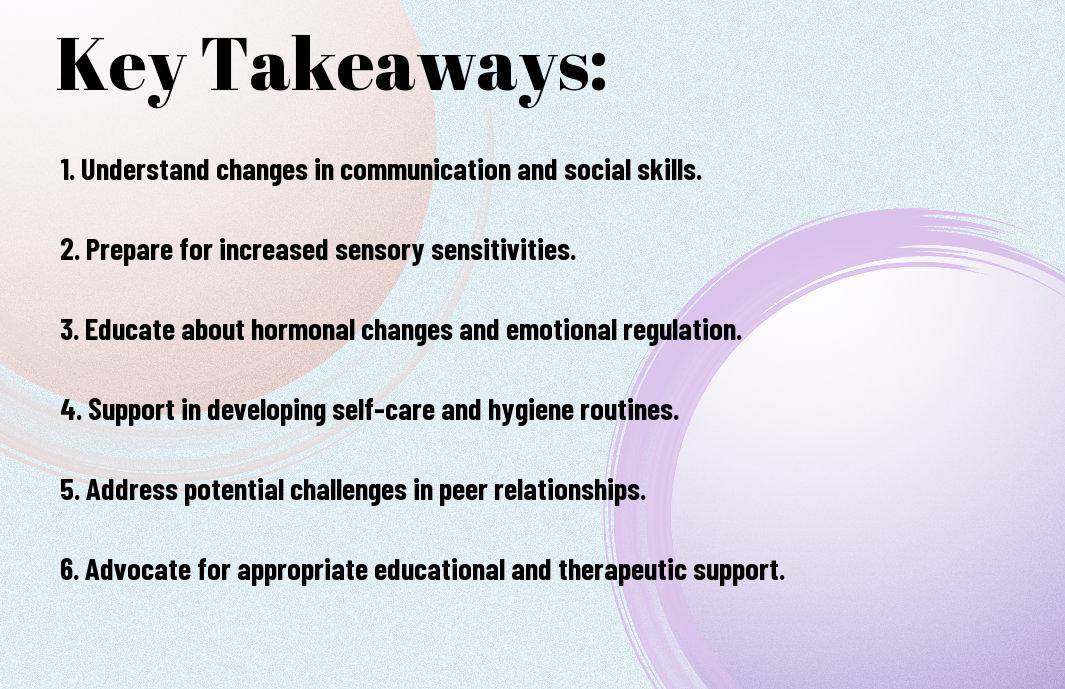Autism is a neurodevelopmental disorder that affects how a person communicates and interacts with others. As individuals with autism move into adolescence, they face new and unique challenges associated with puberty. It is crucial for parents, caregivers, and professionals to understand the impact of puberty on individuals with autism and be prepared to address the associated difficulties. This blog post will explore the physical, emotional, and social changes that occur during puberty for individuals with autism, as well as provide strategies and resources to help them navigate this significant life stage.
Key Takeaways:
- Physical Changes: Puberty can bring about significant physical changes in individuals with autism, and it’s important to be prepared for these changes and provide necessary support.
- Social and Emotional Challenges: Adolescents with autism may experience increased social and emotional challenges during puberty, necessitating tailored strategies and interventions to help them navigate these new complexities.
- Educational and Support Resources: Identifying and accessing appropriate educational and support resources can greatly aid in helping individuals with autism effectively navigate and adapt to the changes and challenges brought about by puberty.

The Intersection of Autism and Puberty
Puberty can be a challenging time for any young person, but for those with autism, the transition can be especially complex. The biological and emotional changes that come with puberty can exacerbate existing sensory sensitivities and social challenges, adding a new layer of difficulty to everyday life. Understanding and preparing for these changes is crucial for parents, caregivers, and healthcare professionals.
For more information about the impact of puberty on individuals with autism, check out this Puberty and autism: An unexplored transition article.
Biological Changes and Sensory Sensitivities
During puberty, the body undergoes significant biological changes, leading to increased sensory sensitivities in some individuals with autism. These heightened sensitivities, combined with the already existing challenges of processing sensory stimuli, can result in heightened anxiety and discomfort. It is important for caregivers and educators to be aware of these changes and provide necessary support and adaptations.
It is crucial to acknowledge the potential impact of these biological changes on individuals with autism and address them with understanding and sensitivity.
Emotional Regulation and Social Challenges
Puberty can also bring about emotional regulation difficulties and exacerbated social challenges for individuals with autism. The hormonal changes and increased social expectations can lead to heightened anxiety, difficulties in understanding and expressing emotions, and challenges in social interactions. Supporting individuals with autism through these emotional and social changes is vital for their well-being and overall development.
Understanding and addressing the emotional and social challenges that arise during puberty can help individuals with autism navigate this transitional period with confidence and resilience.
These emotional and social challenges during puberty are important aspects to consider in the overall care and support of individuals with autism. By understanding and addressing these challenges, we can help individuals navigate through this important transitional period with greater ease and confidence.

Strategies for Support
Communication Techniques for Discussing Puberty
When discussing puberty with individuals on the autism spectrum, it is essential to use clear and straightforward language. Be sensitive to their potential challenges in understanding abstract concepts, and break down information into small, manageable steps. Visual aids such as social stories or picture schedules can also be helpful in explaining the physical and emotional changes associated with puberty. Encouraging open communication and actively listening to their concerns is crucial in helping them navigate this significant life transition.
Creating Predictability and Structure during Transition
During the transition into puberty, creating predictability and structure can provide individuals with a sense of security and stability. Establishing a routine for daily activities, including personal hygiene and self-care tasks, can help reduce anxiety surrounding the changes they are experiencing. Using visual schedules and clear, consistent expectations can also promote independence and self-regulation as they navigate through the challenges of puberty.
By implementing these strategies, caregivers and support professionals can help individuals on the autism spectrum feel more prepared and equipped to handle the changes associated with puberty. Providing a supportive environment that emphasises clear communication and structured routines can positively impact their overall well-being during this transitional phase.
Health and Hygiene Management
In this chapter, we will discuss the importance of health and hygiene management for autistic individuals going through puberty. As puberty brings about new physical and emotional changes, it is crucial to provide appropriate support and guidance to ensure that individuals with autism can navigate this phase with confidence.
Personal Care and Independence
As autistic individuals enter puberty, it is essential to focus on promoting personal care and independence. Encouraging the development of self-care skills such as grooming, bathing, and dressing can significantly enhance their confidence and self-esteem. Providing visual schedules and structured routines can aid in establishing good hygiene habits and fostering a sense of independence.
Addressing Pubertal Health Concerns in Autistic Youth
During puberty, autistic youth may experience a range of health concerns, including menstrual hygiene for girls, understanding body changes, and managing emotions. It is crucial to address these concerns proactively and sensitively. Parents and caregivers should initiate open and honest conversations, provide appropriate education, and access specialist support if necessary, to help autistic individuals navigate these challenges confidently.
It is important to address pubertal health concerns in autistic youth with empathy and understanding. By providing the necessary support and education, we can empower them to manage these changes effectively and promote their overall well-being during this transitional phase.
Educational and Social Considerations
When it comes to autism and puberty, there are several important educational and social considerations to keep in mind. It’s crucial to provide the right support to help autistic teens navigate through this challenging period. For a more in-depth understanding and guidance, check out our comprehensive guide on Autism and Puberty: Guide to Support Autistic Teens.
Adjustments in Educational Settings
Autistic teens may require adjustments in their educational settings to accommodate their changing needs during puberty. This could involve tailored learning strategies, additional support from teachers and teaching assistants, and a supportive environment that understands and respects their unique needs. It’s important to advocate for these adjustments to ensure that autistic teens can thrive academically and socially.
Fostering Healthy Social Relationships
Puberty can bring about significant changes in social dynamics, making it essential to foster healthy social relationships for autistic teens. This may involve providing social skills training, creating opportunities for positive social interactions, and promoting understanding and acceptance among peers. Encouraging participation in group activities and clubs can also help autistic teens build meaningful connections and develop vital social skills.
In addition to the above, fostering healthy social relationships involves creating a supportive network of family, friends, and professionals who can offer guidance and understanding. It’s important to encourage open communication and provide a safe space for autistic teens to express themselves and seek support when needed.

Autism and Puberty – Preparing for New Challenges
In conclusion, preparing for the challenges of puberty for individuals with autism is crucial for their overall well-being and development. It is important for parents, caregivers, and educators to be proactive in understanding and addressing the unique needs and difficulties that may arise during this period. By providing appropriate support, education, and resources, we can help these individuals navigate through the changes and challenges of puberty with confidence and success. It is also crucial to advocate for increased awareness and understanding of autism within the community, to ensure that individuals with autism receive the necessary support and accommodations during this transitional period. By working together and being proactive, we can help individuals with autism thrive during puberty and beyond.
FAQ
Q: What changes occur in a child with autism during puberty?
A: During puberty, children with autism may experience physical, hormonal, and emotional changes similar to their peers. However, they may struggle with understanding and adapting to these changes, which can lead to increased anxiety and challenging behaviour.
Q: How can parents prepare their child with autism for puberty?
A: Parents can prepare their child with autism for puberty by providing clear and age-appropriate information about the changes their body will undergo, teaching them about personal hygiene, and helping them develop coping strategies for managing their emotions.
Q: What are some common challenges faced by children with autism during puberty?
A: Some common challenges faced by children with autism during puberty include difficulties with social interactions, increased sensory sensitivities, and challenges in understanding and expressing their emotions.
Q: How can schools support students with autism during puberty?
A: Schools can support students with autism during puberty by providing social skills training, offering sensory accommodations, and creating a safe and supportive environment for students to express their emotions and anxieties.
Q: Are there any specific resources available for parents and caregivers of children with autism going through puberty?
A: Yes, there are various resources available, including books, online courses, and support groups, specifically tailored to help parents and caregivers navigate the challenges of puberty for children with autism.
Q: How can healthcare professionals support individuals with autism during puberty?
A: Healthcare professionals can support individuals with autism during puberty by providing tailored advice on managing emotional and behavioural changes, offering strategies for building independence and self-care, and collaborating with other professionals to create a holistic support plan.
Q: What can individuals with autism do to prepare themselves for the changes of puberty?
A: Individuals with autism can prepare themselves for the changes of puberty by seeking out information and support, practising self-care routines, communicating their needs and concerns with trusted individuals, and developing strategies for managing stress and anxiety.







